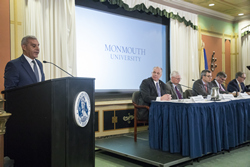The University hosted an open-forum panel discussion on pension and benefit reform with the Public Servant-in-Residence program in the Wilson Auditorium on Friday, Sept. 28.
The Office of the President and the Department of Political Science and Sociology coordinated the Public Servant-in-Residence program, and is featuring former New Jersey state-Senator Joe Kyrillos (R-Monmouth) as its 2018-2019 Public Servant-in-Residence.
Throughout the academic year, Kyrillos will be leading four panel discussions, focusing on pension and benefits reform, bridging the partisan divide, jobs and the economy, and oceans and shore protections, respectively.
In addition to Kyrillos, the first panel included New Jersey Senate President Sen. Stephen Sweeney (D-Glouster); Richard Keevey, a former-Budget Director and Comptroller for New Jersey; Tom Byrne, former-Chair of Senate Investment Council, and member of the New Jersey Pension and Health Benefits Study Commission; Peter Reinhart, Esq., Director of the University’s Kislak Real Estate Institute, and a member of the Fiscal Policy Working Group; and Gordon MacInnes, a former New Jersey state-Senator, and President and Chief Executive of New Jersey Policy Perspective.
“The program was created to provide a venue for public officials to share their expertise with students and the campus community at Monmouth University,” writes University President Grey Dimenna, Esq., in an email inviting students to attend the forum.
Paul Dement, the Director of Government and Community Relations, orchestrated the event as part of the Office of the President.
He believes that pensions are an important issue for the state of New Jersey and, “The panelists were able to communicate that,” he said.
When asking Dement if he thought of pensions to be more important than other issues facing New Jersey residents, such as the high property taxes, he said that he considers all of these issues to be connected.
“I’m not saying that [the pension] issue is necessarily more important than any other issue, but it’s an important issue for the state,” Dement explained.
“And I think the Public Servant-in-Residence this year, Joe Kyrillos, thought it was a good idea to discuss this topic [in the panel],” he continued.
In speaking with Kyrillos regarding who is at fault for the current pension crisis: government officials or state employers, he holds both groups accountable.
He believes that government officials failed to accept responsibility and that state employers became lax in putting money away annually for their workers’ pensions.
During the forum, panelist Sweeney suggested that in order to solve this issue, converting all new state employees to a 401k plan and to keep vesting employees in the present system.
Another solution that Sweeney proposed during the forum would be to reduce healthcare benefits that are already considered “platinum” standard, according to the Affordable Care Act guidelines, to “gold,” which would allow for an influx of money into pensions.
Kyrillos believes that these suggestions are practical solutions to the current issue.
After establishing the plausibility of the proposed state-wide system, Kyrillos addressed whether or not employees of the private sector should be allowed to opt in.
“No, I believe that it is the responsibility of the corporation to take care of their employees,” stated Kyrillos.
Kyrillos made a point by asking the students who were present in the audience whether or not they plan on leaving New Jersey after they graduate college, and many of them raised their hands.
Landon Myers, a senior political science student with a minor in economics, and President of the Political Science Club, expressed that issues like this one are why it is important that students attend these open-forums.
“I think that it’s important because a lot of times, students aren’t engaged in politics and they aren’t engaged in government.”
Myers also believes that awareness of political issues is vital since, “the government determines a lot of what happens in the state.”
He continued, and said, “Actually, a lot of us, personally, pay taxes and the government decides policies and laws that effect everyone, especially as college students too—[such as] higher education funding.”
Perhaps the information provided by the panelists will help keep young adults in New Jersey, to help effect change, and to get and keep students involved in politics and in their government.
The next Public Servant-in-Residence open-forum will be held in the last week of November, and that panel will focus on bridging the current partisan divides in politics.
PHOTO COURTESY of Anthony DePrimo




